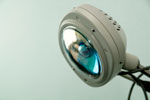 An intriguing health breakthrough has found a greater quality of life for Alzheimer’s patients in light. Light therapy, that is. U.S. researchers have found that light appears to have therapeutic effects on patients with Alzheimer’s disease.
An intriguing health breakthrough has found a greater quality of life for Alzheimer’s patients in light. Light therapy, that is. U.S. researchers have found that light appears to have therapeutic effects on patients with Alzheimer’s disease.
Light therapy has long been a part of natural medicine. It is often used for mood disorders, anxiety and stress. The new study reports that patients treated with blue-green light were perceived by their caregivers as having improved overall functioning.
Caregivers said patients receiving the treatment seemed more awake and alert, were more verbally competent, and showed improved recognition, recollection, and motor coordination. They also said patients seemed to recapture their personalities and were more engaged with their environment. Patients’ moods improved.
RECOMMENDED: Vitamin E Could Protect Against Alzheimer’s.
The study was inspired by the phenomenon known as “sundowning.” This is when Alzheimer’s patients sleep during the day, wake up later, and may be up all night. Part of the primary researcher’s doctoral research was to utilize light, a common intervention for circadian disorders, to regulate the rest-activity patterns of women with Alzheimer’s.
The study addressed disagreement among researchers on the effect of therapeutic light in Alzheimer’s patients. The study involved 20 women older than age 65 with Alzheimer’s dementia from nursing homes in southeast Michigan. Each patient was assigned randomly to an experimental group receiving blue-green light treatments or a control group receiving dim red light.
Although blue-green light recipients comprised the active experimental group, researchers were surprised to learn that the red light group also showed improvements, notably being more calm.
This study is preliminary, but paves the way for future studies on how light therapy can help with diseases as severe as dementia. They are rooted in the brain, after all, and humans have a deep connection with light.
Meanwhile, patients receiving light therapy may be able to sleep better at night, be more awake during the day, eat better and interact with others. While patients may not be able to express it, their quality of life may be improved.
